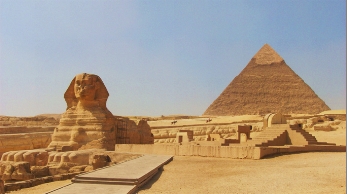
 Arabic is a Semitic language spoken in North Africa, most of the Arabian Peninsula and the Middle East. Arabic is the fifth most widely spoken in the world, with more than 200 million native speakers worldwide. It is the official language in 26 countries. Arabic is the language of the Quur'an, the sacred book of Islam and is the religious language of all Muslims, using classical Arabic. The Modern Standard Arabic is derived from the language of the Quur'an and is understood throughout the Arab World. It is used today in the press, literature, formal documents and is the sixth official Language in the United Nations.
Arabic is a Semitic language spoken in North Africa, most of the Arabian Peninsula and the Middle East. Arabic is the fifth most widely spoken in the world, with more than 200 million native speakers worldwide. It is the official language in 26 countries. Arabic is the language of the Quur'an, the sacred book of Islam and is the religious language of all Muslims, using classical Arabic. The Modern Standard Arabic is derived from the language of the Quur'an and is understood throughout the Arab World. It is used today in the press, literature, formal documents and is the sixth official Language in the United Nations.
 Colloquial Arabic includes numerous spoken dialects depending on different regions in the same country. The principal dialect groups are Egyptian, North African, Arabian, Sudanese and Levantine. Arabic Levantine is spoken in Syria, Lebanon, Jordan, Iraq, Palestine, Israel and understood in most Arabic countries.
Colloquial Arabic includes numerous spoken dialects depending on different regions in the same country. The principal dialect groups are Egyptian, North African, Arabian, Sudanese and Levantine. Arabic Levantine is spoken in Syria, Lebanon, Jordan, Iraq, Palestine, Israel and understood in most Arabic countries.
At the Language Centre we offer a variety of courses to suit learners needs, including some multimedia online materials, which will give you an insight into Arabic culture in addition to learning the language.  The courses start from absolute beginners to Elementary 2. Arabic Basic 1 focuses on Levantine, however you will gain a clear knowledge of the Arabic alphabet and pronunciation and how to read and write simple sentences in Arabic. Arabic Basic 2 and Elementary 1 use Modern Standard Arabic and are suitable for students who have some prior knowledge of Arabic. You will be given the opportunity to express yourself, read and write in the target language and develop your ability to understand native speakers.
The courses start from absolute beginners to Elementary 2. Arabic Basic 1 focuses on Levantine, however you will gain a clear knowledge of the Arabic alphabet and pronunciation and how to read and write simple sentences in Arabic. Arabic Basic 2 and Elementary 1 use Modern Standard Arabic and are suitable for students who have some prior knowledge of Arabic. You will be given the opportunity to express yourself, read and write in the target language and develop your ability to understand native speakers.
The John Trim Centre for Independent Learning has a variety of resources available to you to accompany your learning and explore new materials, and other resources are available on LC Online.
Students who wish to study Arabic for academic and research purposes should consult the Centre for Islamic Studies web page at: https://www.cis.cam.ac.uk/arabic-teaching/about-the-programme/
Qualifications framework level: CEFR A1
Prerequisites
For absolute beginners, or for those with a minimal knowledge of Modern Standard Arabic (MSA) who wish to learn Levantine (Eastern Mediterranean) spoken Arabic.
Educational Aims
At the Basic 1 level the main aims are:
- To develop (B1) and further develop (B2) a basic understanding and an appreciation of the salient linguistic features of the MSA;
- To establish the learner as a fairly confident language user in a wider range of every-day, predictable situations;
- To introduce students to the cultural background of the Arab world within the context of language teaching.
Learning Outcomes
By the end of the Course students will be able to:
| Listening/Speaking | Understand basic instructions or take part in a basic factual conversation on a predictable topic. |
|---|---|
| Reading | Understand a set of basic notices, instructions or information in Latin transcription and some Arabic words. |
| Writing | Learn the Arabic script and numbers, write words and eventually reading a whole sentence. |
Topics
The Course introduces students to functions and notions such as:
Introduction to pronunciation and transliteration scheme; Greetings at a different time of day; Arabic Script; Saying where one is from; Nationality; Giving your phone number; Titles and terms of address; Introducing friends and family; Saying what you do for a living; Saying how old you are; Ordering tea, coffee and other drinks; Offering, refusing, accepting; Asking and paying for the bill; Making enquiries; Understanding the price; Shopping in a market; Checking in at the hotel; Making requests; Understanding the menu; Saying what you like and don't like; Ordering a meal; Expressing appreciation and others.
Syllabus
Qualifications framework level: CEFR A2
Prerequisites
For those who have completed the CULP Arabic Basic 1 course, or for those who have prior knowledge of the Arabic script and of basic Modern Standard Arabic (MSA) structures. This course will focus on listening, speaking and reading skills in MSA.
Educational Aims
At the Basic 2 level the main aims are:
- To further develop a basic understanding and an appreciation of the salient linguistic features of the MSA;
- To establish the learner as a fairly confident language user in a wider range of every-day, predictable situations;
- To enhance students' understanding of to the complex historical and cultural background of the Arab world.
Learning Outcomes
By the end of the Course students will be able to:
| Listening/Speaking | Express simple opinions or requirements in a familiar context. |
|---|---|
| Reading | Understand straightforward information within a known area, such as on products and signs and simple textbooks or reports on familiar matters. |
| Writing | Complete forms and write short simple letters or postcards related to personal information. |
Topics
The Course introduces students to functions and notions such as:
Titles and terms of address; Country of origin and nationality; Family and profession; Talking about the weather; Customs and travels; Daily activities; Ordering a meal; Daily routine; Talking about past holidays; Making inquiries and sightseeing; Saying what you like and don’t like; Asking the way and giving directions; Shopping in a store and market; Sports activities and hobbies; Talking about future plans; Describing your home ; Describing countries and cities; Reading short texts in Arabic.
Syllabus
Qualifications framework level: CEFR B1
Prerequisites
CULP Arabic Basic 2 (CEFR A2).
Educational Aims
At the Elementary 1 Level the main aims are:
- To establish the learner as a confident language user in a wider range of every-day predictable situations as well as in situations related to study and work.
- To further develop and refine the understanding and an appreciation of the salient linguistic features of the Modern Standard Arabic language.
- To deepen students understanding of the complex historical and cultural background of the Arab world.
Learning Outcomes
By the end of the Course students will be able to:
| Listening/Speaking | Express opinions on abstract/cultural matters in a limited way or offer advice within a known area, and understand instructions or public announcements. |
|---|---|
| Reading | Understand routine information and articles, and the general meaning of non-routine information within a familiar area. |
| Writing | Write letters or make notes on familiar or predictable matters. |
Topics
The Course introduces students to functions and notions:
- Talking about oneself and the family
- Describing your home
- Work and daily routine
- Sport and leisure activities
- Travel and tourism
- Food and cooking
- News and media
- Climate and the environment
- Health and happiness
- Arts and cinema
Didactic Materials
The Course features proscribed textbook: Mastering Arabic, Jane Wightwick & Mahmoud Gaafar, the complete second level course, Palgrave Mcmillan master series.
Students are also provided with photocopied materials, audio files and DVD from Al-Kitaab Fii Ta Allum Al- Arabiyya, A Textbook for Beginning Arabic, Edition 2, Rev ed. Brustad, Kristen E., Al-Batal, Mahmoud, Al-Tonsi, Abbas. Bespoke multimedia online materials designed and produced by the LC as well as other multimedia materials available online.
Syllabus
Qualifications framework level: CEFR B1
Prerequisites
Students who have successfully completed Arabic Elementary 1 course in the Language Centre or have acquired a proficiency equivalent to A2.
Educational Aims
At the Elementary 2 Level the main aims are:
- To develop a good understanding of the language structure and vocabulary
- To develop the ability to engage in conversation in Arabic, where the learner is able to express his or her opinion on a variety of topics
- To further develop and refine understanding and appreciation of the salient linguistic features of Modern Standard Arabic
- To develop an awareness of the cultural diversity among Arabic speaking countries and regions
Learning Outcomes
By the end of the Course students will be able to:
| Listening/Speaking | Understand Modern Standard Arabic in a variety of both predictable and unpredictable linguistic situations. Express themselves on a variety of topics with a fair amount of detail. |
|---|---|
| Reading | Read and understand longer texts where visual information is not necessarily available and where the text relies on language structure and lexical refinement to convey specific messages. |
| Writing | Write both formally and informally to a single recipient on a variety of topics, using the appropriate register and structure to achieve communication. |
Topics
The Course introduces students to functions and notions:
- To be able to talk about yourself and introducing others
- Describing your home and talk about your region
- Talking about your free time
- Describing special occasions and talk about Arabic traditions
- Understanding a diagnosis, describing pain and discussing health related issues
- Describing university life and routine
- Introducing Famous people in the Middle east
- Taking about current social issues and dealing with environmental problems
- Planning a holiday, following directions and arranging to meet people
- To be able to talk about the benefits and negative effects of media
Syllabus
Qualifications framework level: CEFR B2
Prerequisites
Students who have successfully completed Arabic Elementary 2 course in the Language Centre or have acquired a proficiency equivalent to B1.
Educational Aims
At the Intermediate 1 Level the main aims are:
- Expanding Vocabulary: At this level, students are expected to expand their vocabulary by learning new words and expressions related to different topics such as family, travel, work, and social life.
- Developing Grammar Skills: to help students develop their grammar skills by learning more complex sentence structures, verb conjugations, and noun declensions.
- Improving Reading and Writing Skills: Students are expected to be able to read and understand more complex texts and to write short paragraphs and essays on various topics.
- Enhancing Communication Skills: Communicate effectively with effectively with native speakers of Arabic and enhance their communication skills by being able to speak and understand spoken Arabic more fluently.
- Developing Cultural Awareness: Learning about the culture and customs of Arabic-speaking countries.
Learning Outcomes
By the end of the Course students will be able to:
| Listening/Speaking | Express opinions on abstract/cultural matters in a limited way or offer advice within a known area. Understand spoken Arabic in both predictable and unpredictable situations in more details. |
|---|---|
| Reading | Understand routine information and articles, and the general meaning of non-routine information within a familiar area. |
| Writing | Write formally and informally about familiar and predictable matters. |
Topics
The Course introduces students to functions and notions:
- To be able to describe people, things, and places.
- Talking about the everyday activities at home, work, and public places
- Talking about holidays and making bookings
- Describing religious and national festivals and celebrations in different regions
- To be able to talk about work, professions, and places of work.
- Sharing online shopping experience.
- Talking about sports as a hobby or as profession.
- Taking about their own experience when they were younger.
- Expressing their wishes and hopes for the future.
- Talking about the natural life around them
- Discussing the danger of pollution and its harmful effects on health.
- Talking about their dream houses.
- Sharing with others good or sad news and expressing their opinion.
Syllabus


 The Language Centre
The Language Centre
